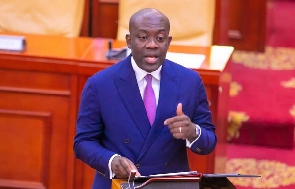About two months ago, the Information Minister, Kojo Oppong Nkrumah urged Ghanaians to start parting with dollars they had since the cedi's depreciation will be dealt with. According to him, the country was expecting about 2 billion dollars that he is optimistic with help the cedi. The loan facility was made up of $1.3 billion Cocoa Syndicated loan and $750 million Afreximbank loan. He made the statement in August when the cedi was selling at above GH¢10 at various bureaus. Currently the cedi sells above GH¢11 despite the receipt of the $750 million Afeximbank loan. Read the full story originally published on August 23, 2022 by GhanaWeb The Information Minister has encouraged Ghanaians to heave a sigh of relief as government is expected to inject about $2bn into the ailing economy. Kojo Oppong-Nkrumah noted in an interview with Citinewsroom that this means the rapid fall of the cedi will be a thing of the past, shortly. Since the start of this year, the Ghana cedi has suffered persistent depreciation against major trading currencies, especially the US dollar. As of July, this year, the cedi lost its value by more than 20 percent. The local currency is now trading above GH¢10.00 to one US dollar on the exchange rate market. But the minister allaying the fears of citizens revealed that while 750 million dollars is expected from the Afremix Bank this week, the cocoa syndicated loan will add $1.3 billion. These monies, he said, are expected to hit the Bank of Ghana's account. “The Bank of Ghana introduced a number of measures in the short term to deal with it and on the back of that… the $750 million that we were expecting, all the paperwork has been concluded, and it should be hitting our accounts today or tomorrow,” he said. “If I were you, and I was holding onto dollars, I would be selling them by now because there is a lot more dollar coming in from the $750 million and also from the Cocoa Syndicated Loan of about $1.3 billion,” the minister added. According to Oppong-Nkrumah, the move forms part of government's expectation of "quick stabilisation" of the economy. A recent currency performance ranking by Bloomberg showed that the cedi was classified as the worst performing currency in the world after Sri Lanka's Rupee. The Bank of Ghana has assured that it is implementing measures including increasing foreign currency (FX) supplies to banks in the short term to help meet growing FX demands for external payments.
Business News of Tuesday, 11 October 2022
Source: www.ghanaweb.com













